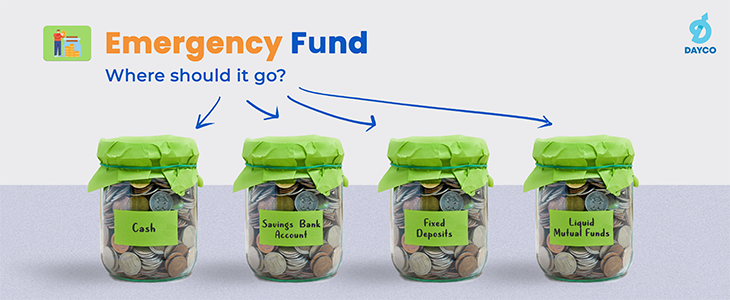In this blog, we shall discuss one of the essential habits that make for good financial health– an Emergency Fund. Assuming that you budget and account for every expense diligently, have you given thought to what would happen if things were to go erratic for a bit? After all, we shouldn’t discount the possibility of something terrible happening. Similar to how a physician would put it– “Prevention is better than cure”. If not more, financial health is equally vital as physical and mental fitness.
What is an Emergency Fund?
An emergency fund is, like the word says, an emergency bucket of money that is to be used in case of emergencies. The point of a good emergency fund is to keep yourself from piling up debt and navigating financial crises better. A good emergency should be made up of at least 6-9 months of your living expenses. In order to arrive at the amount, aggregate what you spend monthly on rent, utilities, food & grocery, mortgage, conveyance, health, etc. If there are expenses that you do not incur monthly, calculating annual expenses and then averaging would be better.
What Is The Importance of Emergency Funds
- To stop piling debt: Emergency expenses can help you bear expenses that you were not expecting and pay them yourself. If you do not have a fund in place, it would be easier to take on personal loans or credit card debts. A debt would only stress your existing finances in an emergency and more so if you are trying to pay off existing debt.
- If you have a single source of income: A single source of income makes it more critical that there is a sufficient fund to rely on. A medical illness or job loss can impact your life substantially. An emergency fund would help avoid that scenario by helping you meet your expenses while you look for another job or recover from an illness.
- Stay the course: Emergency fund prevents you from dipping your hands into important savings. In meeting unannounced expenses, you could easily withdraw from savings that you make for your goals like retirement, house purchase, child’s education, etc. This would stall your progress. Hence, an emergency fund is a great way to protect your goals.
- Medical expenses: Unannounced medical expenses can be financially draining. The rising medical costs further add to large medical bills. In a medical condition, expenses like medicine and routine tests are a constant, and health policies cannot be relied upon to pay every expense. A well-financed fund can help you bear these expenses easily.
- Unexpected expenses: An emergency fund can also act as a buffer for other unexpected expenses besides the ones mentioned above. These typically include things like a vehicle breakdown, essential home repairs, meeting expenses in a natural disaster or fire, unanticipated taxes, and much more.
Final Word
Having or building an emergency fund should be part of your financial planning. It moves you closer to a healthier financial life. But it is also essential that you understand and classify expenses that you would use the fund for. It would be best if you avoided the urge to use funds for expenses that aren’t an emergency. Meeting expenses during unemployment, sudden home repairs and medical expenses, or a natural disaster are top ways to use an emergency fund.
If you have a question, share it in the comments below or DM us or call us – +91 9051052222. We’ll be happy to answer it.
– Nischay Avichal
















